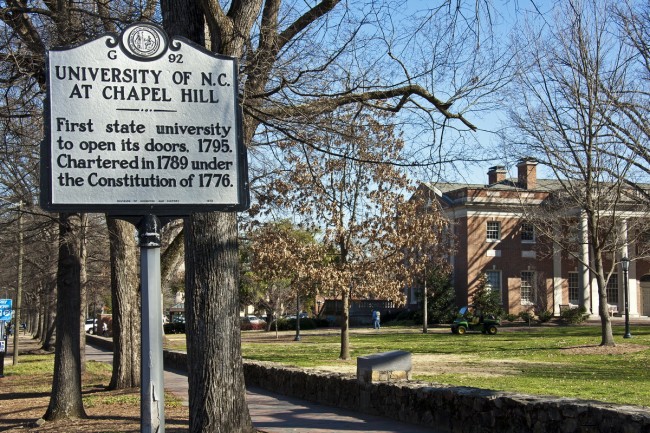People under the age of 30 account for most of the HIV cases in the United States. But a new program at UNC is designed to try and change that.
The National Institutes of Health granted the university and colleagues at Emory $18 million over the next five years to develop the UNC/Emory Center for Innovative Technology, or iTech.
“Our center is really focused on ‘How do we take technology that youths use every day and allow that technology to work for them in hopes of either preventing HIV infection or helping them manage their HIV infection if they’re already infected,’” said Lisa Hightow-Weidman an associate professor at UNC in the Infectious Diseases Division.
She says the program will use technology to design interventions addressing HIV among youth all over the country.
“In the work we’ve done, we’ve seen high levels of acceptability, of satisfaction, with the interventions, and starting to see some positive behavior changes as a result.”
She says the program enrolls participants online and gives them the access and anonymity that the lack thereof may have kept them from educating themselves about HIV.
“So a lot of our projects don’t use…participants’ names, but allow them to have avatars or other names that they select, but still allow them to engage with other users who are experiencing the same things they are.”
In the most recent intervention, Hightow-Weidman says the program enrolled 500 young African-American men, and after 12 months, retention was at almost 75 percent.
She says, although the program is working well and is successful so far, there is only so much that can be done right now without physically making an appointment with a doctor, physician or specialist.
“Technology can’t address every aspect of this epidemic, but if it can bridge some of the things that keep youth from engaging in care, and from seeking out these services, then we’ve sort of accomplished part of what we’re looking to do.”
iTech is based at UNC but has seven satellite campuses across the country.
iTech was one of three centers selected in the country to develop these interventions. There are currently six studies planned with the fund, but doctors and professors working on the program hope to add more.
Related Stories
‹
![]()
UNC Virologists Discover New Strategy to Treat HIV InfectionsHIV has infected over 70 million people according to the World Health Organization, but virologists at UNC-Chapel Hill are now one step closer to stopping the spread of the insidious pathogen. The effective but temporary nature of current HIV treatments was the impetus for Dr. J. Victor Garcia and his team to consider how the […]
![]()
UNC Awarded $23 Million Grant for HIV ResearchUNC will continue its innovative “kick and kill” initiative for eradicating HIV after being chosen to receive funding from The National Institutes of Health. Over the next five years, UNC will receive funding of nearly $23 million after being chosen from a competitive application process by the NIH, according to a release from the university. […]

Policy, Language and Tech: UNC's Angel Hsu Discusses Combating Climate ChangeAngel Hsu is an associate professor in UNC’s environmental ecology program. She recently spoke with 97.9 The Hill about her work as the director of a data-driven envirolab and how technology can teach us more about combating climate change on a local government level. Check out highlights of the conversation below, which are lightly edited […]

UNC Professor & Video Journalist Jim Kitchen Works at a Coffin Shop in MalawiMalawi was one of the more pleasant countries I’ve visited. It’s a tiny country, roughly the size of Georgia, and it’s one of the friendliest and hospitable places in Africa. It was almost unsettling how people will speak freely with you. For example, in the elevator, people will just say hello and ask how […]
![]()
Orange County Makes Efforts to Improve Broadband in Rural Parts of CountyOrange County is requesting proposals from broadband providers interested in improving service in rural parts of the county. Orange County Information Technologies was tasked with working to improve broadband technology and access for Orange County residents in 2014. Orange County chief information officer Jim Northrup updated the Board of County Commissioners last week on initiatives […]

Panel of AIDS Memorial Quilt on Display at UNCA panel of the AIDS Memorial Quilt is currently on display at UNC’s Student Union. UNC Sophomore Elizabeth Trefney and her family organized to bring the panel, which features her uncle Jeremy who died of AIDS, to UNC. Trefney hopes bringing the panel to UNC will help continue to raise awareness for the disease. “I […]
![]()
UNC Research: Daily Pill Allows HIV Patients to Live "Normal Life"UNC researchers have found the use of a combination of AIDS medications can help prevent the transmission of HIV through sexual activity. Doctor Myron Cohen is the Director of the Institute for Global Health and Infections Diseases at UNC. He told WCHL’s Blake Hodge more about the discovery. This work will continue to find a […]
![]()
Homeownership, Scholarship, Taxes And Snow DaysCongrats to local high achievers; learn how to buy an affordable home; snow changes CHCCS schedule; get help on taxes.
![]()
UNC Prof. Awarded Highest State Civillian HonorMyron Cohen says. “I came to Chapel Hill in 1980, and the first cases of HIV in Chapel Hill were in 1981."

'Together is The Only Path Forward': Orange County's Habitat for Humanity Hosts Affordable Housing SummitAmid a shortage of affordable housing – both locally and nationally – the Orange County chapter of Habitat for Humanity recently held a summit to discuss how leaders can collectively aim to better address the issue.
›






